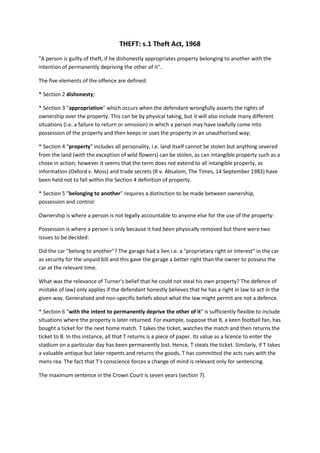
Theft Act 1968 elements
- 1. THEFT: s.1 Theft Act, 1968 "A person is guilty of theft, if he dishonestly appropriates property belonging to another with the intention of permanently depriving the other of it". The five elements of the offence are defined: * Section 2 dishonesty; * Section 3 "appropriation" which occurs when the defendant wrongfully asserts the rights of ownership over the property. This can be by physical taking, but it will also include many different situations (i.e. a failure to return or omission) in which a person may have lawfully come into possession of the property and then keeps or uses the property in an unauthorised way; * Section 4 "property" includes all personality, i.e. land itself cannot be stolen but anything severed from the land (with the exception of wild flowers) can be stolen, as can intangible property such as a chose in action; however it seems that the term does not extend to all intangible property, as information (Oxford v. Moss) and trade secrets (R v. Absalom, The Times, 14 September 1983) have been held not to fall within the Section 4 definition of property. * Section 5 "belonging to another" requires a distinction to be made between ownership, possession and control: Ownership is where a person is not legally accountable to anyone else for the use of the property: Possession is where a person is only because it had been physically removed but there were two issues to be decided: Did the car "belong to another"? The garage had a lien i.e. a "proprietary right or interest" in the car as security for the unpaid bill and this gave the garage a better right than the owner to possess the car at the relevant time. What was the relevance of Turner's belief that he could not steal his own property? The defence of mistake of law) only applies if the defendant honestly believes that he has a right in law to act in the given way. Generalised and non-specific beliefs about what the law might permit are not a defence. * Section 6 "with the intent to permanently deprive the other of it" is sufficiently flexible to include situations where the property is later returned. For example, suppose that B, a keen football fan, has bought a ticket for the next home match. T takes the ticket, watches the match and then returns the ticket to B. In this instance, all that T returns is a piece of paper. Its value as a licence to enter the stadium on a particular day has been permanently lost. Hence, T steals the ticket. Similarly, if T takes a valuable antique but later repents and returns the goods, T has committed the acts rues with the mens rea. The fact that T's conscience forces a change of mind is relevant only for sentencing. The maximum sentence in the Crown Court is seven years (section 7).